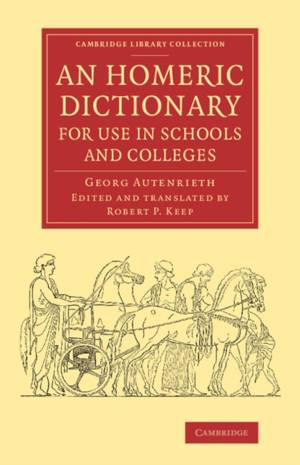
- Afhalen na 1 uur in een winkel met voorraad
- Gratis thuislevering in België vanaf € 30
- Ruim aanbod met 7 miljoen producten
- Afhalen na 1 uur in een winkel met voorraad
- Gratis thuislevering in België vanaf € 30
- Ruim aanbod met 7 miljoen producten
Zoeken
An Homeric Dictionary for Use in Schools and Colleges
From the German of Dr Georg Autenrieth
Georg Autenrieth
€ 78,95
+ 157 punten
Omschrijving
The dialect of ancient Greek in which the Homeric epics the Iliad and the Odyssey were composed and later written down is sufficiently different from classical Attic Greek that it has always proven a stumbling block for students. Perceiving the need for a concise dictionary of Homeric Greek forms, German scholar Georg Autenrieth (1833-1900) compiled this now famous work, first published in 1873 and translated into English by Robert P. Keep (1844-1904) in 1877. Keep, who taught Greek at Yale University and various New England colleges, recognised from his own experience that Autenrieth's book would enable students to proceed faster and further in their studies of Homer than could ever be the case using a conventional dictionary, where dialect forms received a relatively cursory treatment at the end of each entry. The worldwide success of the work, reissued here in its first English edition, has justified this belief.
Specificaties
Betrokkenen
- Auteur(s):
- Vertaler(s):
- Uitgeverij:
Inhoud
- Aantal bladzijden:
- 360
- Taal:
- Engels
- Reeks:
Eigenschappen
- Productcode (EAN):
- 9781108074575
- Verschijningsdatum:
- 17/04/2014
- Uitvoering:
- Paperback
- Formaat:
- Trade paperback (VS)
- Afmetingen:
- 140 mm x 216 mm
- Gewicht:
- 458 g

Alleen bij Standaard Boekhandel
+ 157 punten op je klantenkaart van Standaard Boekhandel
Beoordelingen
We publiceren alleen reviews die voldoen aan de voorwaarden voor reviews. Bekijk onze voorwaarden voor reviews.











